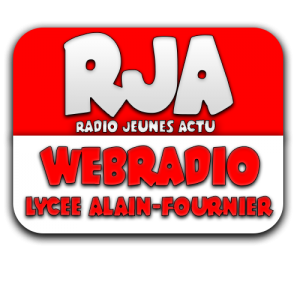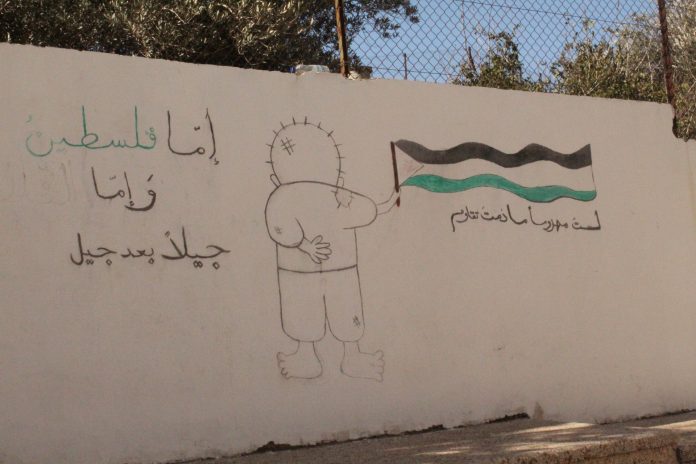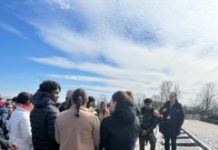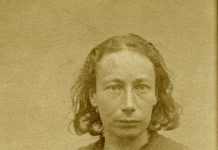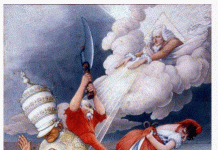Translation : Mrs Sandie Daniels
It is seven in the morning and we are having breakfast.
We have to leave at 8 a.m. as to meet up for 9 a.m. at the evangelist school of Ramallah. The Palestinian government’s headquarter is only 11km away from Jerusalem but we have to take into account the check point at the entrance of the city.
This control area with watch tour and fences are a mere reflection of the ‘Cisjordania partition as we call it over here in the west, into zone A, B and C.
This is the result of the OSLO accords.
This should have been only a transition, until the creation of a palestinian state.
In principle, Palestine is its own country in zone A. Some red signs signal Israelis trespassing, reminding them the law from their state. So why then, on the Israeli side, do we come across so many vehicles with palestinian number plates?
Boaz, our driver, fills us in further on…
Despite the restriction, numerous arabic Israelis come into Palestine to buy everyday goods for less.
Not everybody is allowed in Ramallah, far from it. The scenery made up from unkept roads and precarious building sets the scene. Our driver asks his way to some idle youngsters who have suddenly found with us an occupation for the day. Some of them find food or small objets to sell for survival. A while later, the very young weaponless police officer is a bit luckier, as his state salary is guaranteed : he can tell us the way to go.
After a detour through the MOUQATA’A, the Palestinian government’s headquarter, we arrive at the school.
We are warmly welcomed by Mr Najeh Abu Shamsiyeh who hence introduces us to the pupils who are part of the school council. After a brief introduction to the building reconstructed after the bombing and expanded in 2004, we are ready to start the tour. At the bottom of the stairs, we have to let the little ones back from their PE lesson. We are going upstairs to have a look at the staff room and say ‘hello’ to Mr Rafidi, the headmaster. We are then let into a class, aged 5 to 7. They welcome us with french songs rehearsed with the teachers. ‘So sweet’ is our lot’s reaction.
We next head to the library, and settled down into a room next door to have a chat : Reen, Hazar, Rita and Sadeen explain to us their role within the school council. Rita, who is also the very young president of the council, has a story to tell : her dad was imprisoned in Israel before she was born; now aged 16, she is no longer allowed to visit him in prison. As her peers, she has numerous duties within the school. She is in charge of the little ones and organising summer camps where the young learn about art and craft.
All the pupils then explain about their everyday life. Even if the school provides some kind of haven, they feel as if they were living in a prison: they can’t go about as they would like to. Some of them have never even seen the sea.
Hazar is insistent that some Israelis make incursions into Ramallah to hurt young palestinians. ‘Our’ Emma then asks them if some sort of peace seems conciliable to them? They think not, as the current situation stands, the peace would only provide for Israel.
‘Our’ Lazlo then asks them about what they think about the 2 states settlement? Rita answers that: on a personal level, it is inconceivable. We move on to ask them what questions they would like to ask the Israelis, given the opportunity. The silence is long… Then Rita suggests: do they really know about our situation?
Whilst saying our ‘goodbyes’, an adult old enough to have believed in the Oslo accords tells us how much the new generations, on both sides of the wall, are taking different paths.
Is this the truth? Time will tell us later in the day.
One of the many ways to Galilee, north of Israel, is through the Jordan valley. To get back onto road 90 crossing form South to North, we cut across East, nearby Jericho, the world’s most ancient city.
There, in the desert, below 350m sea level, we have our lunch. Some of us have a camel ride, but we have to be swift as we are late.
Along the road, we come across a rosary of villages both Israeli and Palestinian. We quickly learn how to spot the former : they are surrounded by high wall-walks and barbwires. The flag printed with David’s shield is in view to remind us that their bearers believe this land is Eretz Israel, promised to the Jews by God. To them, these villages are mere implantations… To Palestinians, they are very much colonies.
The Israelis believe to be living in Judea- Samaria, the latter live in Palestine. Cisjordania is the french designation. The anglo-saxons call it West Bank. The least we can say is that these territories are claimed.
As far as the Palestinians and the UN is concerned, this land is ‘occupied’.
We are now in zone C, controlled by Israel.
But we have to go through a check point yet again to go to Galilee.
Further on is the village of Beit Yerah. Mr Altbauer is there to welcome us with his pupils. They are just out of their history mock A levels. Just what we need…They have prepared a wonderful tea for us but there is little time as, just like in France, the bus home can’t wait.
In two groups, we are split and guided through the school by pupils. We find a paradise school with top of the game equipment and even its own beach! But the reality strikes back. One of our boys asks what is the small concrete building in the middle of the yard. Our young guide doesn’t leave us clueless for long and takes a key out from under a stone. With a knowing nod, she makes us seal our secret as we walk into the bomb shelter. The small shack is only the top of the installation that can host many in case of a bomb strike. Everyday, they mostly do art lessons in there, recycling materials.
Coming out of the shelter, the Golan plateau, annexed by Israel in 1967 and then claimed by Syria, takes our sight away : it helps us understand a little moreof the insecurity one must feel living around here as a student. It is called the Massada complex : you feel trapped, besieged, surrounded by many enemies.
Maybe this can explain, earlier on, the long silences when we asked the palestinian students what they knew of the every day life of their counterpart : ‘What we know, we learn it through the T.V. Comme si, comme ça (sic).’
It is time to say ‘goodbye’ after giving away our presents.
We can’t help feeling, as we leave, that all these young don’t know each other, and yet are so similar. It is disheartening but it would have been foolish to believe otherwise.
We are chewing on our doubts on the side of the lake.
End of January, this place has the feel of an old-fashioned sleepy bath town.
